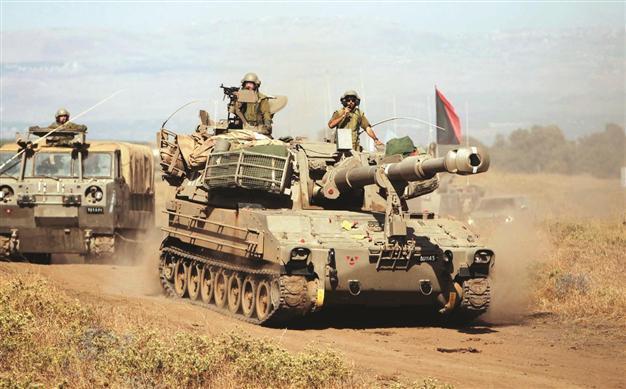Syrian army advances to retake Homs, Aleppo
PARIS / ALEPPO

Israeli soldiers sit atop a mobile artillery vehicle (front) as they return from a drill near the Quneitra border crossing between Israel and Syria, on the Israeli-occupied Golan Heights. Tension is high in the area. REUTERS photo
The Syrian army continues to advance to the strategic cities of Homs and Aleppo as France has urged the international community to stop the progression of Syrian troops, backed by Hezbollah fighters and Iran.
After winning a strategic victory by retaking Qusayr, an important town near the border with Lebanon, Syrian troops are now focusing their attention on Homs and Aleppo as they continue to gain ground against the rebels. The army operation is conducted in the southern and northern countryside of Aleppo, according to activists, and the aim is to cut off the rebels’ supply line from Turkey and attempt to regain control of the north. Intensified clashes are also reported in Homs and its suburbs as the army closed in on besieged, rebel-held neighborhoods of the provincial capital. Activists said there were heavy clashes, mostly in the neighborhood of Wadi Sayeh. The fighting appeared to be an attempt by government forces to separate two main rebel-held areas in the city, Khaldiyeh and the center of Homs.
“We must stop this progression before Aleppo. It is the next target of Hezbollah and of the Iranians,” French Foreign Minister Laurent Fabius said on France 2 television.
“We need to rebalance things because over the past few weeks the troops of Bashar al-Assad and especially Hezbollah and the Iranians, along with Russian arms, have gained considerable ground.” But he did not expand on how Syrian troops, buoyed by military support from its Shiite allies Hezbollah and Iran, should be stopped. Fabius’ comments came as U.S. Secretary of State John Kerry was scheduled to meet with his British counterpart, William Hague, later yesterday to discuss Syria. Hague warned last week that regime gains on the ground raised a new hurdle to the planned peace conference. “The regime has gained ground on the ground, again at the cost of huge loss of life and the indiscriminate use of violence against the civilian population,” Hague told BBC television.
“That makes the Geneva conference harder to bring about and to make a success. It makes it less likely that the regime will make enough concessions in such negotiations, and it makes it harder to get the opposition to come to the negotiations.”
On June 11, France’s Foreign Ministry also warned that the crisis was at a “turning point.”
“What should we do under these conditions to reinforce the opposition armed forces? We have had these discussions with our partners, with the Americans, the Saudis, the Turks, many others,” said ministry spokesman Philippe Lalliot. “We cannot leave the opposition in the current state.” The European Union, under pressure from London and Paris, last month failed to renew an arms embargo on Syria, leaving individual member states free from August 1 to supply weapons to the opposition, if they decide to do so.
Fabius said France had not yet decided what to do after the deadline. “Bashar... used chemical weapons in an outrageous manner. We must stop him because, if there is no rebalancing on the ground, there will be no peace conference in Geneva as the opposition will refuse to come,” he said. The United States said it was evaluating information received from France that Paris has billed as proof that chemical weapons have been used in Syria.
